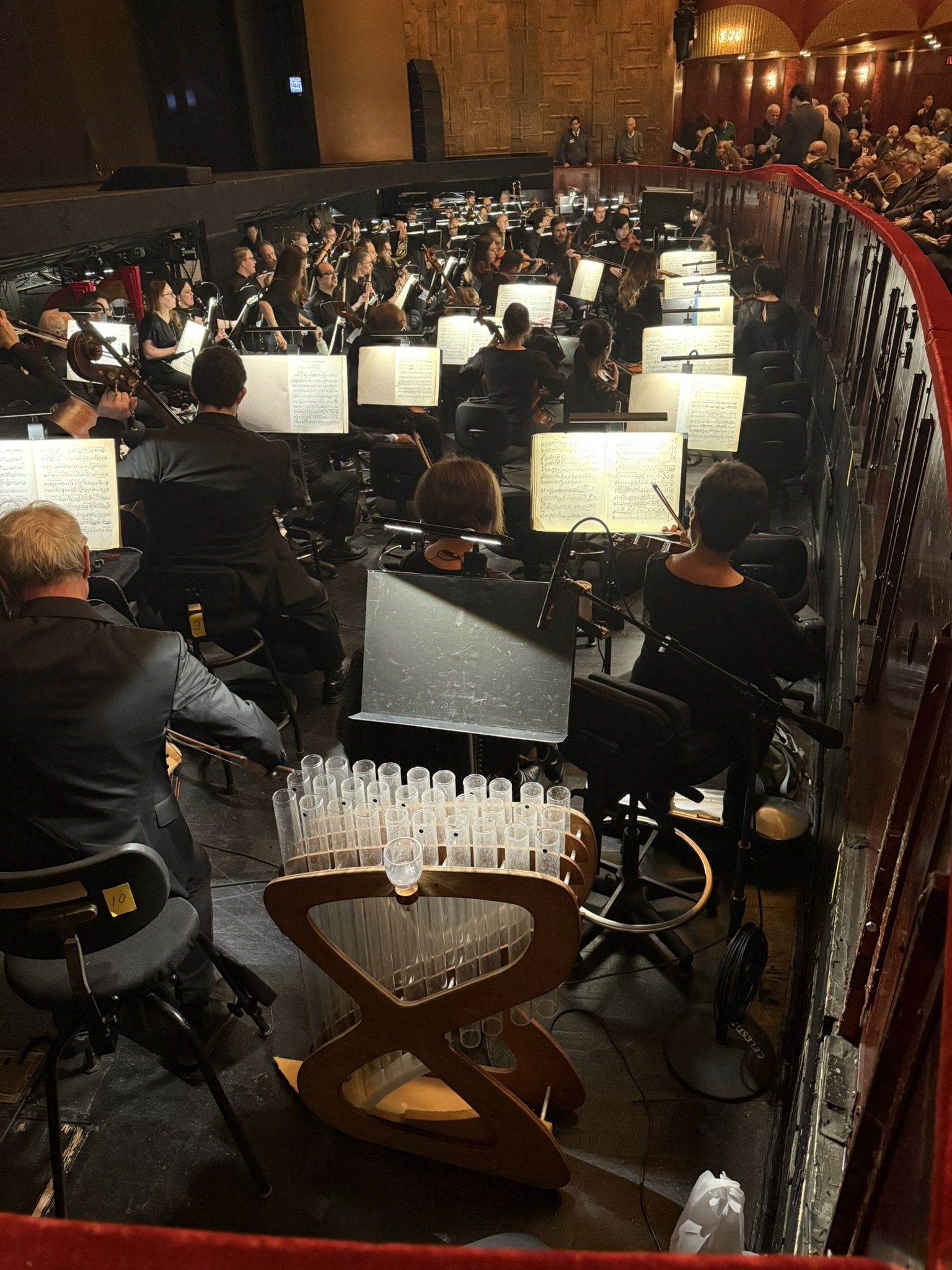Opera penetrates your soul's darkness and consumes you, and then the orchestral sounds take it away. Six performances of Strauss's Die Frau ohne Schatten have just finished at the Metropolitan Opera. It's a 4-hour opera, including breaks. Concerts and operas have completely different appeals. Even if you usually experience great sound with headphones or audio, you become part of the work in a box that 3,800 people can experience simultaneously. In this world where people sacrifice the misfortune of others to obtain their happiness, Strauss's opera Saving Her Husband Instead of Self-sacrifice and Helping Other Unhappy Couples to Become Happy premiered” premiered in 1919, the year after the outbreak of World War I.
This is a passage from Act 3 where Kaiserin decides not to drink the water of life.
Doch weich' ich nicht! (Open by another window)
Mein Platz ist hier in dieser Welt.
Hier ward ich schuldig,
hierher gehör' ich.
Wo immer du
dich birgst im Dunkel –
in meinem Herzen
ist ein Licht,
dich zu enthüllen!
Ich will mein Gericht!
Zeige dich, Vater!
Mein Richter, hervor!
But I will not give in!
My place is here in this world.
Here I became guilty,
here I belong.
Wherever you
hide in the darkness –
in my heart
there is a light
to reveal you!
I want my judgment!
Show yourself, father!
My judge, come forward!
In her live, I was devastated. Afterward, she told her true feelings and was saved. The day before the last performance, I listened to this passage more than 10 times while looking at the lyrics. If I could get it, I would be saved. But even if it meant sacrificing someone else's life or happiness, I wouldn't do it or take it. This work was created 100 years ago. However, watching it depicts a social phenomenon no different from today. To save herself, she takes a Witch to a Human couple who are not getting along and tries to woo the bride to save himself. After seeing it three times and listening carefully for three weeks, I realized that the opera's darkness, light, and phenomena are the same as my absolute world. The darkness of the Kaikobad is the sacrifice of those around you that occurs when you have someone you love and try to be happy with that person. Couples who are having an affair should watch it: the red falcon, the shadow, the water of life. The husband who turns to stone is the only human with a name. These symbols also appear in my own life. I struggled, was overwhelmed, and wandered through the four hours of Strauss performed by the Metropolitan Opera Orchestra and singers, and I was saved. It means to be part of the work at the performance. Most audiences watch the singers when they like the set and the singer more. However, they can experience it because the orchestra portrays psychology. If an opera singer came in front of you and sang, you would think she was crazy.
On the link, Kaiserin sings, "I exist in this world, I have committed sins, and yet this is where I belong." There is almost no music, but the oboe reflects her darkness. Kaiserin's suffering is conveyed as if looking at a painting, followed by the dark theme of Kaikobad, timpani, and brass. She is the daughter of the darkness and tries to control the light she has found. Human psychology is shaped by sound. The most surprising thing was that at the beginning of the 3 act, there is a scene where the dyer's husband comes home and drinks beer, and the clarinet plays the sound of "gulping". Strauss's magnificent music is a story of the discovery of the psychology of the world by the writer Hofmannsthal. And it is an ordinary story. Opera is about looking at your feelings, turning consciousness into action, bringing light to darkness, and showing you the way.
Thursday, December 19, 2024 7:30–11:40pm at The Met Opera, New York
RICHARD STRAUSS
CONDUCTOR, Yannick Nézet-Séguin
NURSE, Nina Stemme
SPIRIT MESSENGER, Ryan Speedo Green
EMPEROR, Russell Thomas
EMPRESS, Elza van den Heever
DYER'S WIFE, Lise Lindstrom
BARAK, THE DYER, Michael Volle
人生に悩みはつきものだ。そしてオペラはあなたの心の闇に入り込みあなたを飲み込む。そしてオーケストラのサウンドはその闇を取り除く。
メトロポリタン歌劇場でシュトラウスの影のない女の公演が6回あり終わった。休憩含め4時間のオペラだ。演奏会とオペラは全く違う面白さがある。普段ヘッドフォンやオーディオで素晴らしい音を体験していても、3800人が一度に体験できる箱の中で自分が作品の一部になるということだ。そして彼らは自分の心と体と楽器だけで作品に命を吹き込み、それを聴き手は同時体験している。他人の不幸を犠牲に自分の幸せを手に入れるこの世に、シュトラウスは、自己犠牲の代わりに夫を救い、うまくいっていない他のカップルも幸せになる話を1919年、第一次世界大戦開戦の翌年に初演。
これは3幕で命の水を飲まないと決める前カイザリンの一節。
Mein Platz ist hier in dieser Welt.
Hier ward ich schuldig,
hierher gehör' ich.
Wo immer du
dich birgst im Dunkel –
in meinem Herzen
ist ein Licht,
dich zu enthüllen!
Ich will mein Gericht!
Zeige dich, Vater!
Mein Richter, hervor!
私は諦めない。
私の居場所はこの世界のここにある。
ここで私は罪を犯した。
ここが私の居場所。
あなたがどこにいても
暗闇に隠れて
私の心の中に
光があります
あなたを明らかにする
私を裁いて
姿を現してください、お父さん!
私の裁きよ、現れて!
But I will not give in!
My place is here in this world.
Here I became guilty,
here I belong.
Wherever you
hide in the darkness –
in my heart
there is a light
to reveal you!
I want my judgment!
Show yourself, father!
My judge, come forward!
この音を生で浴びると打ちひしがれる。そのあと彼女は本音を語り救われる。最後の公演を見る前の日、この一節だけ10回以上歌詞をみながら聴いた。それを手に入れれば私は救われる。それでも、誰かの命や幸せを犠牲にしてもそれをしない、取らない。この作品ができたのは100年前だ。しかし、見ていて今と何も変わらない社会現象を描いている。自分が助かるために魔女を連れて、うまくいっていない人間の夫婦の家に行き、嫁を口説いて自分が助かろうという話だ。3回見に行ったし3週間よく聴いた結果、闇や光、オペラで起こる現象が自分の現実世界と同じことだと気が付いた。カイコバードの闇は、愛する人がいて、その人と幸せになろうとするために生じる周りの犠牲だ。不倫をしているカップルは見たほうがいい。赤いハヤブサ、影、命の水。石になる夫、一人だけ名前がある人間の夫。こういった象徴は自分の人生にも出てくる。メトロポリタン歌劇場オーケストラと歌手たちが繰り広げるシュトラウスの4時間にもがき、打ちのめされ、さまよった結果、救われた。これがその公演で作品の一部になるということだ。大体のお客さんはセットや歌手の姿を、もう少し好きになると歌を見る。しかし、その世界を体験できるのは、その心理をオーケストラが全体を描いているからだ。オペラ歌手が目の前に来て、自分の歌詞だけ歌うのをみても、ただのおかしい人にか見えないだろう。この一節では「私はこの世界に存在し、私は罪を犯し、それでもここが私の居場所」とカイザリンが歌う。音楽はほぼついていないが、オーボエが彼女の闇を映す。絵を見るように明らかにカイザリンの苦悩が伝わって、そこにカイコバードのティンパニやブラスの薄暗いテーマ。彼女が闇の帝王の娘で彼女が見つけた光を支配しようとする。人の心理を音で描いている。一番驚いたのは3幕の始め、染め物屋の夫が、帰ってきてビールを飲むシーンがあるが、クラリネットが「ゴクゴク」という音を演奏していた。作家、ホフマンスタールの世間心理発見物語にシュトラウスの見事で壮大な音楽。そしてありふれた話。自分の気持ちを見つめ、意識を行動に変え、暗闇から光を取り出し、道案内をしてくれる。オペラとはそういう物だ。
音の宇宙。彼らの意思が作品に命を吹き込む。
A universe of sound. Metropolitan Opera brings life to the piece.
コンサートマスターのデビットは3幕でとても長いソロがある。その楽譜をお客さんとみていた。Concertmaster David, has a very long solo in Act 3, was looking over his part with the audience.
デビットとマルーンのサイン。Autograph of David, Concertmaster, and Fulte, Maron Anis Khoury
友人が撮った最後の集合写真。もうこのキャストでは二度と見ることが出来ない。
The last group photo taken by my friend. We'll never see this cast again.
マルーン。この人がいなければ、オペラをこんなに良く聴こうとはしなかっただろう。
Maroon. Without him, I would never have listened to opera so well.
by classicasobi






